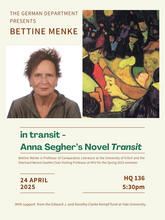in transit - Anna Seghers’ novel “Transit”, with Bettine Menke
Abstract:
As Hannah Arendt observed in Origins of Totalitarianism, the “refugee” has become a mass-phenomenon paradigmatic for politics on account of the globally enforced nation-state principle. This is still the case today, as “defense” against “illegal migrants” and the rejection of those seeking protection escalates in public discourse and in the actions of states. Our contemporary reading of Anna Seghers’ novel Transit inevitably relates the situation in Marseille in 1940, where those seeking refuge were driven by the Nazi occupiers of France and their Vichy collaborators, to the current refugee regime in which European states, institutions, authorities, and task forces turn refugees into illegals, or “outlaws” (as Arendt put it).
Seghers’ novel models Marseille as threshold, a marginal transit zone, a transitory space, an intermediate zone of exception, a waiting room, in which for an indefinite period of time intentions, experiences and aims are suspended. The people who are fleeing, are passing by, in the novel are called “transients.” The first-person narrator, like everyone else in this zone, is a “nobody” (with many false names) who does not become a contoured figure against this background. The narration itself participates in the hearsay, the rumors that circulate without an identifiable source or author on which the transients depend to learn about the conditions of staying and departing. But who knows what applies in this transit zone?
Short Bio:
Bettine Menke. Professor of Comparative Literature at Erfurt University, has earned her PhD at the University of Konstanz with her work on Walter Benjamin’s concepts of language and their reflections in his texts (Sprachfiguren. Name - Allegorie - Bild nach Walter Benjamin), her habilitation focuses on the Figures of Voice and its defacements in the literary works of the Romantics and of Franz Kafka (Prosopopoiia. Stimme und Text).
Her numerous books and articles focus on literary theory, theatre, deconstruction, memoria, gender studies, the scripturality of texts, the mediality of theatre, and the concepts of cultural techniques. Her last book deals with wit and the jokes (Einfälle, Zufälle, Ausfälle. Der Witz der Sprache, 2021), many of her recent publications focus on the theatrical, literary and political discourses on refugees. She is currently preparing a book on translation and the languages of ‘the other.’
